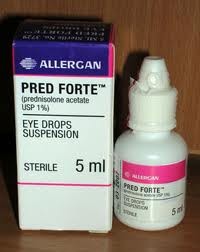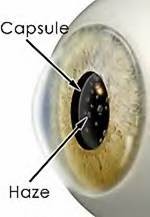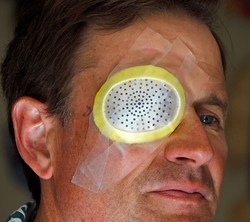Cataract surgery has become a relatively un-complicated surgery with a really high success rate. The thing is, however, that people have to realize that even though the surgery only takes from 10 to 15 minutes, it can still take as much as 2 weeks for people to recover from it. The eyes need to have time to adjust to their intra-ocular lenses installed by the doctors. People with additional medical problems like diabetes or high blood pressure will see that cataract surgery recovery times are going to be substantially longer than it is with healthier people.

Recovery After Cataract Surgery
by CRfan
Although cataract surgery is a relatively safe surgery precautions must still be taken after to minimize risk.
What can And Cannot Be Done Immediately After Surgery
After a person has cataracts removed, they need to lay down for around half an hour or up to an entire hour. This allows the anesthesia to totally wear off. Trying to drive immediately after cataract surgery is definitely not recommended, especially when you consider the affected eye is going to be covered with a bandage or protective shield. You may be allowed to remove the shield after a few hours but it still needs to stay in place when you go to sleep or while napping.
Within a few hours of surgery people can shower, bathe, watch TV, and even work a bit on their computer. They should not, however, engage in heave lifting, exposing their eyes to grime, pollution, or dust, or put any heavy pressure on their eyes. Lot of doctors recommend that people avoid driving at all until the next day after their surgery. Swimming is to be avoided for the entire first week after cataract surgery has taken place.
 Be sure to follow your doctor's instr... |
Unpleasant Side Effects
It's true that some people will experience crystal clear vision within a few hours of their surgery, but many will go through periods of 'wavy' or 'blurry' vision. It can take some time for your eyes to adjust so there's no need to panic if you can't see clearly for a few days after a cataract surgery. Fortunately most vision problems shouldn't last any longer than just a few days tops. There have been some rare cases where a patient didn't get full clear vision back for a couple of weeks.
Another common problem is bloodshot eyes. After cataract surgery the blood vessels found on the eye's surface might be damaged temporarily. They will heal on their own and this redness will usually disappear within a few days. Having dry eyes can be another very common problem. If the person who has the surgery didn't have this dry eye problem before having the surgery, then this discomfort should correct itself in a few days.
There are some doctors who give patients anesthesia by a shot that goes through the skin and into the lower part of the eye. This will commonly result in bruising that looks like a black eye. Patients should not be alarmed at this because it doesn't lead to any lasting type of eye damage and heals on it own in a few days.
The 'Danger Signs' Of Cataract Surgery Recovery
As stated above most of the time people have no problems recovering from their cataract surgeries. Actually, research shows that only 2 percent of all patients will develop any type of serious eye problems which could be sight threatening. You do, however, need to be aware of the danger signs so you know when to see a doctor about your symptoms.
You might still not have recovered to fully clear vision and it has been a couple weeks since your surgery. However, over these past two weeks you should experience a gradual improvement in your vision. It things remain the same or deteriorate then it is time to talk to your doctor. Anyone experiencing any unusual discomfort or pain needs to talk with a surgeon. A small amount of discomfort is normal after surgery but should never persist for over a couple of days.
There are rare cases when people can develop general eye infections immediately after surgery. These infections are known as 'endophthalmitis' and they can threaten a person's sight. If you have high blood pressure or diabetes then you have more of a chance of developing an infection than other people. If a person has either one of the health problems they definitely need to inform their surgeon before they have the operation so extra precautions can be taken.
Posterior  Capsular Opacification happens to be another consideration for cataract surgery patients. This usually happens sometimes weeks or sometimes months after having successful cataract surgery. It can cause your vision to get cloudy. Fortunately it is easily treated by having a simple procedure used for commonly restoring your vision.
Capsular Opacification happens to be another consideration for cataract surgery patients. This usually happens sometimes weeks or sometimes months after having successful cataract surgery. It can cause your vision to get cloudy. Fortunately it is easily treated by having a simple procedure used for commonly restoring your vision.
While having cataract surgery presents a little different recovery process between each patient, there are still some things that are common to all. Anyone recovering from this procedure need to take care of their eyes and use the eye drops the doctor prescribes and avoid engaging in any strenuous activities. Having blurry vision should be expected but most of the time clears up by itself. Recovery can take time and complications can arise, but most everyone who has been through this type of surgery can expect to have sharper, clearer eyesight within just a couple of weeks after surgery.
You might also like
Anosmia - Can it be reversed ?Anosmia- loss of the sense of smell is one of the first signs of Parkinson's ...
Tudor remedies and cosmeticsYesterday I visited a Medieval Hall for a Tudor medicine and cosmetics talk. ...



 How The FDA Approves New Medicineson 08/16/2013
How The FDA Approves New Medicineson 08/16/2013
 10 Tax Mistakes Business Owners Makeon 08/05/2013
10 Tax Mistakes Business Owners Makeon 08/05/2013
 Accessories For Traveling With Jeweleryon 02/12/2013
Accessories For Traveling With Jeweleryon 02/12/2013
 Stages of the Sleep Cycleon 09/23/2012
Stages of the Sleep Cycleon 09/23/2012


Comments
Yeah you should be seen by an eye doctor soon. Call a local one and describe your symptoms.
I have white flashes, they have become pronounced and flowing in a cressant shape. Is there anythg to worry about? My vision is fine, l am a diabetic with high blood pressure, thx.